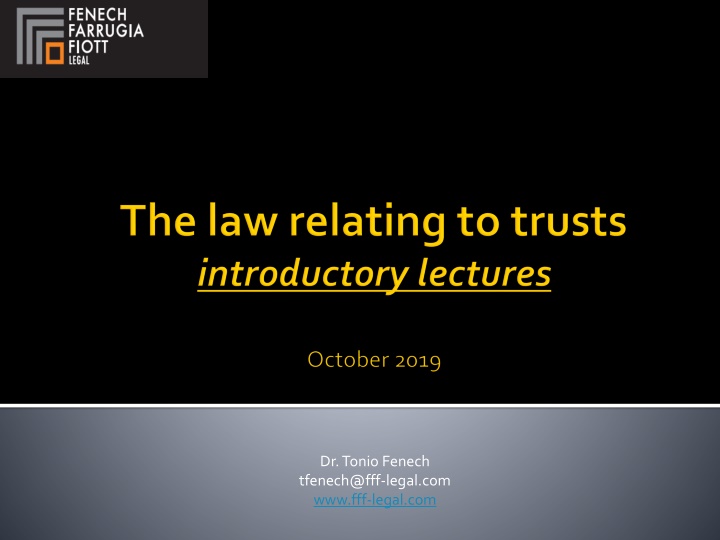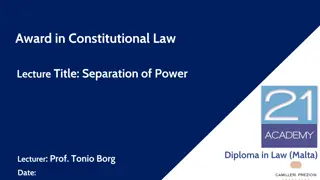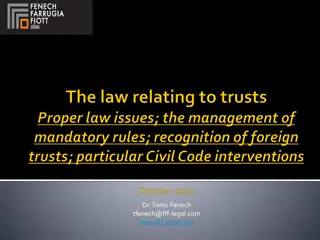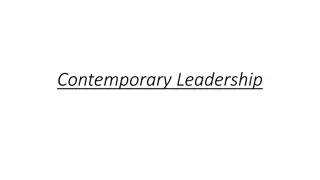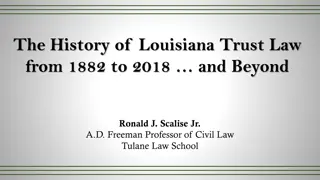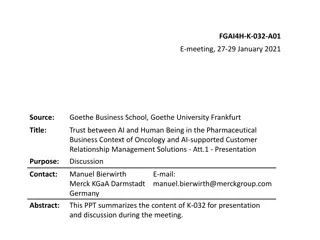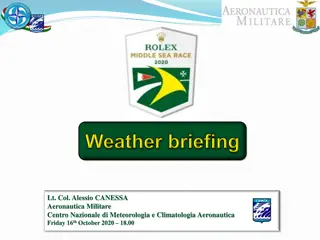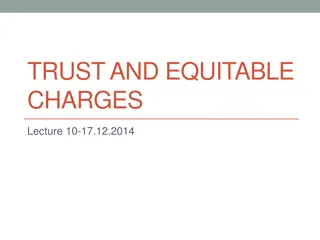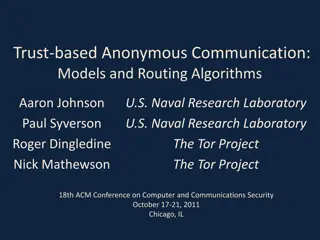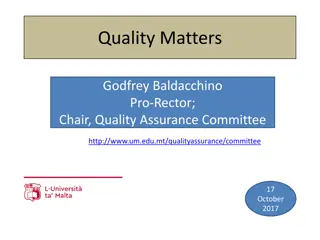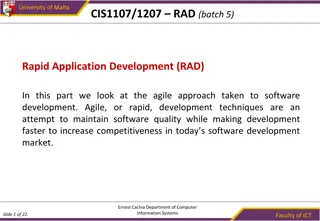Evolution of Trust Law in Malta
Malta, with a unique legal system integrating civil and common law concepts, has evolved its trust law over the years. The concept of trust was gradually adopted, culminating in full integration into domestic law post-2004. Recent amendments have further solidified the legal framework, bridging the gap between civil law traditions and fiduciary obligations. This evolution reflects influences from Roman law and English trust concepts, reshaping Malta's legal landscape.
Download Presentation

Please find below an Image/Link to download the presentation.
The content on the website is provided AS IS for your information and personal use only. It may not be sold, licensed, or shared on other websites without obtaining consent from the author.If you encounter any issues during the download, it is possible that the publisher has removed the file from their server.
You are allowed to download the files provided on this website for personal or commercial use, subject to the condition that they are used lawfully. All files are the property of their respective owners.
The content on the website is provided AS IS for your information and personal use only. It may not be sold, licensed, or shared on other websites without obtaining consent from the author.
E N D
Presentation Transcript
Dr. Tonio Fenech tfenech@fff-legal.com www.fff-legal.com
Civil law system, but with the benefit of over 150 years of British rule, juridicallyspeaking Malta has therefore experienced dove-tailing common law and civil law concepts for over a hundred years, something that the EU was still trying to get right until Brexit happened; Theconcept wasadopted instepsbetween 1988 and2004; After 2004 the concept of trust has become fully integrated into our domesticlaw; The trust can now be seen as falling within the general category of relationships where fiduciary obligations are owed, and has a particular statute regulating the relevant relationships; Latest amendments to the Trusts Statute were in 2017, but the civil code provisions of Fiduciary obligations were last amended in 2018 www.fff-legal.com
Concept adopted for limited purposes, and in a clearly ring-fenced manner by the Offshore TrustsAct1988: completelyoffshore Very closely and openly modelled on the Jersey Act1984, toprovideforcertainty As Recognition of Foreign Trusts Act 1994 allowed for the the local recognition of foreign trusts, while maintaining theonshore-offshore divide experience started consolidating, the www.fff-legal.com
With the enactment of the Act XIII of 2004, a number of laws were amended, and the Civil Code was also fundamentally amended, in order to fully integrate the concept The legislator clearly concludedthat the traditional view that the concept is completely alien to the Civil law was too simplistic, and ought to be discarded; In fact the equivalent of the English concept of trust can be found in the Early Roman Law concept of fiducia being an agreement appended to a conveyance of property, involving a direction or trust as to what was to be done with it (Buckland). Although recognized as a concept, it eventually disappeared by the time of the Justinian codification of Roman law www.fff-legal.com
Ganado: The English concept of Trust is itself a derivation of the Roman Law concept of fiducia, being an agreement appended to a conveyance of property, involving a direction or trust as to what was to be done with it (Buckland). Institute recognized, but never listed as a nominate contract. Some considered it a pactum , which could only occur as an appendage to a conveyance, and need not be reduced to writing By the time of Justinian, the concept seems to have disappeared, but its subtle effects are very evident in the Civil Code to this very day. www.fff-legal.com
The unfortunate thing about the Codes is that because of their very brilliance and nature, being guidelines within a framework, they necessarily result in some subsequent rigidity in thought....if one is told how to do certain things to achieve certain ends then one follows the pattern. The risk is that one then assumes that anything outside the patternis not possible. The Code Napoleon, influenced by the French Revolution, sought to prohibit entails to destroy the illiquidity of land, andconcentration of property inthe handsof the nobility. Many civilian lawyers came to assume that ALL trusts are entails,andtherefore contrary to public policy www.fff-legal.com
Title IIIA in Part IIof Book Second of the Civil Code , entitled Of Trusts & their effects has 10 Articles: Art. 958L 958U; Art. 958L(1): Property under trusts shall be regulated by the speciallaw on trusts and to the extent applicable, the rules of this Coderelating to trusts. Title XXIIIA of the Code is entitled Of Trusts and Obligations has 5 articles, dealing with the effect of trusts on marriage and annuities, as well as security trusts; The Trusts & Trustees Act (originally enacted as the Offshore Trusts Act in 1988 but substantially amended on various occasions since then), is Chapter 331 of the Laws of Malta. Obligations in general under the Civil Code now include Fiduciary Obligations , ie Art. 1124A to J. The most recent amendments here were in 2018, which has widened the legislative treatment from 2 to 10 Articles www.fff-legal.com
Dr. Tonio Fenech tfenech@fff-legal.com www.fff-legal.com
The 2018 amendments to the provisions of fiduciary obligations seem to have the objective of completing the project started in 2004; In 2004, the objective seems to have been that of having trusts properly allocated to the general class of relationships that create fiduciary obligations; In 2018, more detailed provisions and stipulations were introduced for this general category, including specific remedies, but the approach remained clear: The Civil Code provisions were a general platform over which specific types of fiduciary obligation could be regulated through a specific title in the Code or more specialized legislation, such as the case of trusts. www.fff-legal.com
In order to complete the project, some rules were required in order to ensure clarity as to which set of rules applied, and when. Therefore, of the 10 Articles which now regulate fiduciary obligations in general, it would seem important to start with the last Article, entitled Applicability provisions of this Title of the www.fff-legal.com
When a fiduciary relationship is governed by particular rules, whether because of the source and type of the obligations or because of any special law, such particular rules shall apply to the context and these provisions shall apply as necessary to support the interpretation of the said rules; a. It shall be presumed that the provisions of the Title are consistent with particular rules, but the particular rules prevail where inconsistent; b. The provisions of the Title apply to all fiduciary obligations, even those existing before 2018, but there is no retrospective application where this denies or restricts vested rights or creates a new liability; c. www.fff-legal.com
d. where a fiduciary obligation is vitiated (becoming unenforceable due to the falsity of illegality of the cause ) by a breach or attempted breach of law by the parties or any one of them, either party can render this enforceable by complying with the relevant law thus rendering the cause legal; The court can in such cases give interim orders to ensure compliance or to prevent further abuse. www.fff-legal.com
Fiduciary obligations arise in virtue of law, contract, quasi-contract, unilateral declarations including wills, trusts, assumption of office or behaviour whenever a person (the ''fiduciary ) owes a duty to protect the interests of another person and it shall be presumed that such an obligation where a fiduciary acts in or occupies a position of trust is in favour of another person; or Has registered in his name, holds, exercises control or powers of disposition over property for the benefit of other persons, including when he is vested with ownership of such property for such purpose; or receives information from another person subject to a duty of confidentiality and such person is aware or ought, in the circumstances, reasonably to have been aware, that the use of such information is intended to be restricted. A delegate of a fiduciary, is also deemed a fiduciary if he was aware, or should, from the circumstances, have been natureofthe relationship. aware, of the fiduciary www.fff-legal.com
Fiduciary obligations arise from behaviour when a person without being entitled, appropriates or makes use of property or information belonging to another, whetherfor his benefit or otherwise; or being a third party, acts, being aware, or where he reasonably ought to be aware from the circumstances,of the breach of fiduciary obligations by a fiduciary,and receives or otherwise acquires property or makesother gains from or through the acts of the fiduciary www.fff-legal.com
General duty to act with utmost good faith and honestly, in all cases www.fff-legal.com
Other duties, alterable by instrument in writing or express provision of law: to exercise the diligence of a bonus pater familias inthe performance of his fiduciary obligations; to avoid any conflict of interest or conflict of trust or fiduciary obligations; not to receive undisclosed or unauthorised profit from his position or functions nor permit any other person from doing so, nor enter into any transaction related to the property, directly or indirectly, unless authorized to do so by the instrument creating the fiduciary obligation or permitted by a person or authority empowered to approve such dealings; to act impartially when the fiduciary duties are owed to more than one person; to keep any property acquired or held as a fiduciary segregated from his personal property and that of other beneficiaries, and to affect a change in the registration of any relevant property, as may be required for such purpose; to maintain suitable records in writing of the interest of the person to whom fiduciary obligations are owed; to render account in relation to the property subject to fiduciary obligations; www.fff-legal.com
Other duties capable of alteration: to return on demand (or upon termination of the fiduciary obligation) any property held to the person lawfully entitled thereto or as instructed by him or as otherwise required by applicable law. To keep the affairs of the beneficiary confidential To carry out the designated purpose, where property has been entrusted to him Confidential information can be disclosed to the beneficiary in accordance with and subject to any restrictions contained in the written instrument, if any, giving rise to the fiduciary obligation. A declaration by a fiduciary that he is acting in such a capacity is not a breach of such duty. In addition to other remedies at law, the fiduciary must return any property together with any benefits derived, directly or indirectly, including property into which the original property will have been converted -Art. 1124A(5)&(6) www.fff-legal.com
1124A7-10 were all added in 2018 A competent court may make an order or declaration in favour of beneficiary, including: Order the transfer, restitution or delivery of any property, or change in registration to another fiduciary; Terminate powers of disposition of property; Order the provision of adequate security; Establish a trust, including its terms; Rescind any transfer or other transaction or declaring the same null and void; Impose damages on the fiduciary Above powers available in any proceedings by any beneficiary or other person whom the court considers entitled under the relevant fiduciary obligation. Third party acquiring under onerous title shall not be prejudiced, provided he was not aware that he was dealing with a fiduciary www.fff-legal.com
Fiduciary duties may, in particular cases, be considered implicitly waived in certain circumstances, such as: Method of engagement of fiduciary, in particular where he has multiple purposes, functions or offices or where he is granted contemporaneous entitlement; Scope, purposes and contexts of the fiduciary obligations imposed; Delivery of property to a beneficiary s creditor by way of security or for a purpose which is distinct from that of the beneficiary; Manner of acceptance or assumption or undertaking of the fiduciary obligation Where there is a waiver (implicit or express), the fiduciary may apply for directions from the competent court on how to act in the circumstances The court shall give due regard to the intentions of the person establishing or imposing the fiduciary obligations and to the interests of both the fiduciary and the beneficiary www.fff-legal.com
The marginal note previously read Ownership by a fiduciary . The section was relatively short and provided for three basic principles: Where ownership of property is vested in the fiduciary, third parties may act in relation to such person as though he were the absolute owner thereof; Property held by fiduciary is not subject to claims or rights of action of his personal creditors, nor his spouse or heirs at law; Third parties in good faith can rely on declarations made by the fiduciary re his authority, and need not enquire about this, or obtain consent from the beneficiaries or anyone else www.fff-legal.com
Post 2018 amendments, the section is longer and more complicated; The marginal note now reads dealings with third parties aware of fiduciary obligations Where they are aware that fiduciary is vested with ownership, has registered in his name, holds, exercises control or powers of disposition over property as fiduciary, third parties in good faith can deal with the fiduciary as if he is absolute owner; A third party acquiring property under an onerous title is not affected by fiduciary obligations to which the property is subject, unless otherwise agreed upon ; www.fff-legal.com
The situation is different where a third party acquires in terms of Art. 1124B(1) under gratuitous title, and: the fiduciary will have acted in breach of a fiduciary obligation; or The third party acquired to the detriment of a beneficiary Here, he will be subject to the same fiduciary obligations, as from when he becomes aware or he reasonably ought to have become aware of the breach of fiduciary obligation The obligation is however limited to the extent of the breach or unauthorized gain, unless the Court provides otherwise pursuant to any of the remedies in Art. 1124A www.fff-legal.com
TP in good faith is entitled to rely on fiduciarys declaration regarding his authority, and need not: enquire into terms and conditi0ons of fiduciary s authority, except where transaction is gratuitous; Obtain the consent of the beneficiary of the fiduciary obligations TP is entitled to enquire about the purposes of the fiduciary obligation, including the obligation of not exceeding the value raised by the transaction , or otherwise relating to the property subject to the transaction or the applicability of the funds in question. www.fff-legal.com
The following declarations by a fiduciary are not a breach of confidentiality: That his authority exists, the date the relevant instrument was executed and that the authority has not been revoked; That he is authorised to carry out the transactions being entered into; The identity and address of the fiduciary! But any certificate containing a statement which he knows or ought to know is false shall be guilty of an offence liable to punishment of imprisonment up to 2 years or a fine (multa) www.fff-legal.com
Where a TP has been informed, is aware or should reasonably be aware that a fiduciary is acting in such capacity, the fiduciary is not personally liable for the obligations entered into, other than those entered into in the exercise of his obligations. Where TP is unaware of the fiduciary obligations, the fiduciary is personally liable for the obligations entered into, subject to any terms stipulated or applicable law. Fiduciary has a right of recourse against the beneficiary where contemplated by law, by way of indemnity, unless he has acted in breach of his duties Fiduciary is presumed to have all powers required to perform fiduciary obligations towards beneficiaries or purposes www.fff-legal.com
Property held by a fiduciary (even in ownership), shall constitute a distinct and separate patrimony, consisting of all relative rights and obligations with respect thereto Fiduciary ownership is integral as far as third parties are concerned, but modified by the Code as well as any special laws that may be applicable, as far as the beneficiary (and/or purpose) is concerned. Where property is held but not in ownership, the provisions of this Code and any other special law governing the relationship shall apply in accordance with the terms established by the parties (but can be modified in terms of the law for the protection of the beneficiary or the achievement of the obligation www.fff-legal.com
Any beneficiary can enforce fiduciary obligations on the basis of the provisions of this Title; The demand may be made together with any other action available at law as part of a general action or by an additional application to the Court, at any time of the proceedings until the award of a final judgement by the competent court or the Court of Appeal; Action can be exercised by any person or body granted due authority in the instrument creating the obligation, where this is for a purpose, and in the absence of a beneficiary; Where undertaken by a public benefit organization, the AG can also utilize the remedy www.fff-legal.com
No prescription where action is brought: For fraud or dishonesty to which fiduciary was party, or had knowledge thereof; For recovery of property from the fiduciary where this has been converted to his use, or for benefits or gains received as a result of breach of duty; A fiduciary cannot acquire property as a result of time bar, even if in good faith; Any act of a fiduciary in bad faith is sufficient for an action not to be barred by prescription www.fff-legal.com
Otherwise, an action by a beneficiary for breach of any other fiduciary obligation referred to in Art. 1124A(4) lapses after 5 years, from the date (whichever earlier): of delivery of a written account of fiduciary activity to the beneficiary; On which the beneficiary first had knowledge of the occurrence of the breach of fiduciary duty; If the written account is itself dishonest, then the latter date shall count with reference to such account www.fff-legal.com
To perform obligations agreed in writing, provided in the relevant instrument giving rise to fiduciary obligation, or as may arise at law; Pay remuneration and expenses to fiduciary as may be established under the relative instrument, or as may be reasonable Fiduciary may reimburse himself or pay out of the property expenses properly incurred, and inform beneficiary www.fff-legal.com
Beneficiary must at all times act in good faith towards the fiduciary Subject to the terms of the instrument, and to the extent of the property (unless agreed otherwise), the beneficiary shall indemnify the fiduciary for any liabilities incurred, except to the extent fiduciary is guilty of negligence, willful misconduct or fraud. www.fff-legal.com
Long and detailed provisions regulating this important aspect of holding property subject to fiduciary obligations. These are deemed beyond the scope of these lectures, but remain an important area that requires careful study www.fff-legal.com
Dr. Tonio Fenech tfenech@fff-legal.com www.fff-legal.com
Mandate relationships in general now fall squarely within the ambit of fiduciary relationships A mandatory for an undisclosed beneficiary (a so-called nominee ) also specifically regulated Art. 127 of the Companies Act deals with company shares held in trust and nomineeship www.fff-legal.com
Deposit: acceptance of custody of a thing gratuitiously to be returned on demand. Title does not pass, and depositary can force depositor to take thing back. Contract terminates on death of depositor; Fideicommissa: A transfers title of thing to B, subject to duty to pass it on to C when A dies. Clearly distinguishable from trust; Community of acquests: a form of reciprocal trust, produced ipso jure as a normal effect of marriage. In certain cases, however, creditors can access paraphernal assets when community of acquests is insufficient www.fff-legal.com
Inheritance with the benefit of inventory: an heir accepts estate without being liable fordebts attaching to it (etc). Separation of estates, and heir can even retain rights if claim against estate, but heir can renounce to estate; Foundation: in some limited senses, this is a form of corporate trust, but settlor can have much more influence. New juridical entity, with administrators its officers Directorship: the Companies Act is not specific about this (see Art. 136A generally), but it is generally held under English law that Directors owe fiduciary duties; www.fff-legal.com
Art. 127 of the Companies Act: Unless otherwise provided in its articles, a company formed and registered in Malta shall not recognise any nominee relationship or trust in respect of any security issued by it, and the company shall not recognise, even when having notice thereof, any interest or other right in such security, but shall only recognise the registered holder thereof. The Article accepts situations where shares are held by a trustee , and provides some definitions: "beneficial owner" means the person beneficially entitled to the shares under a trust or a fiduciary agreement; "trustee" shall mean a person who may act as a trustee in accordance with the Trusts and Trustees Act and shall include any fiduciary holding shares on behalf of another person. www.fff-legal.com
Mizzi et vs Fenech et, decided on 29th September 2016, by Mr. Justice Joseph Zammit McKeon in the First Hall, Civil Court; This case was not appealed from, and should therefore be considered final tfenech@fff-legal.com www.fff-legal.com
dan l-artikolu ma hu xejn ghajr l-applikazzjoni generali tal-ligi illi fil-qadi tad-doveri tieghu, impjegat irid iqis l-interess tal-principal tieghu u jagixxi bid-diligenza kollha fil-qadi ta dmiru, u aktar ma hi gholja l-posizzjoni jew il-kariga, aktar jassumi piz l-obbligu ta fedelta lealta, onesta u buona fede fil-konfront tal-principal Huma in-natura tal-kariga, ir-responsabilitajiet u poteri afdati ..li jiddeterminaw u jiddelineaw il-qies tal-fiducja riposta u mistennija www.fff-legal.com
The Mizzi case is not about the duties of trustees; It is a contractual scenario where a committee of professionals were given wide discretion to evaluate assets with a duty to come to an equitable conclusion between the parties; How is this relevant for trustees in a Maltese context? tfenech@fff-legal.com www.fff-legal.com
Two brothers owned a company between them; Incompatibility of characters and personalities led to a decision to split the business amicably; A valuation committee (VC) was formed to report on and decide how to split certain assets, including immovable assets within the business after valuation The relevant Agreement mandated the VC to utilize specific valuation methodologies for different assets, but otherwise provided for valuations in accordance with generally accepted valuation principles and concepts and in such manner as the Valuation Committee may at its sole discretion consider equitable in the circumstances . The VC appointed architects, who established the value of two buildings (the Building Report) as part of their mandate; tfenech@fff-legal.com www.fff-legal.com
In their final report, the VC gave a value which included a value of the Buildings, but also gave an option to each of the brothers to ignore the Building Report and to opt for a so-called property disposal mechanism , which in essence provided for the sale of the building concerned; One of the brothers opted for this, but the other eventually obtained a Court of Appeal judgment that the mechanism was in fact ultra vires in terms of the VC s remit; A dispute arose as to whether the value without reference to the mechanism had become final, given certain alleged mistakes made by the architect tfenech@fff-legal.com www.fff-legal.com
The brother who had opted for the disposal mechanism filed suit, requesting that the court : 1. Declare the Building Report as defective; 2. Order defendants to revise the Building Report; 3. Alternatively appoint other architects for the same purpose; 4. Declare that the VC has yet to reach an equitable valuation for the relevant building; 5. Order the VC to revise the compensations payable under the Agreement 6. Order the VC to complete the division of assets of the Company tfenech@fff-legal.com www.fff-legal.com
The Court essentially considered the demands in two batches: Issues connected with the Building Report (the first three demands); And The duties, if any, of the VC in the light of the removal of the property disposal mechanism option (the last three demands) tfenech@fff-legal.com www.fff-legal.com
Given that the VC had to be driven by principles of equity, the Court felt it had to evaluate the Building Report, as equity will not be respected if it contains material mistakes and the VC continued to rely on it. The Court found no material defects in the report and rejected the first 3 demands; tfenech@fff-legal.com www.fff-legal.com
The court upheld 4th and 6th demands in the sense that the valuation already made by the VC was subject to possible review, now that the disposal mechanism was not available. The fact that a disposal mechanism was provided indicated that the VC had some doubt about the equitable nature of the theoretical exercise made by the architect alone. The VC can determine whether to adopt measures or make other verifications tfenech@fff-legal.com www.fff-legal.com
The court went out of its way to state that the judgment should not influence the VC, whose sole obligation is an equitable conclusion to their mandate; The judgment should not be interpreted as an indication that the rejection of the first 3 demands implies a requirement to rely on the architect report, or the VC s own report tfenech@fff-legal.com www.fff-legal.com
the judgment was given in the context of a clear contractual acceptance of fiduciary obligations by the VC members, as well as a wide discretion given in order to fulfil a duty to find an equitable conclusion to their mandate; Can similar duties be implied in respect of a fiduciary who is simply given discretionary powers without a specific reference to principles of equity and justice? tfenech@fff-legal.com www.fff-legal.com
Art 993, Civil Code: Contracts must be carried out in good faith, and shall be binding not only in regard to the matter therein expressed, but also in regard to any consequence which, by equity, custom, or law, is incidental to the obligation, according to its nature. tfenech@fff-legal.com www.fff-legal.com
Pace vs Micallef, Ct. of Appeal, 15.12.2004, made reference to principles of equity in good faith, in order to attack a rigid interpretation of contractual duties; It stated that a certain element of equity together with practical and moral considerations were included in the concept of good faith. It characterized its own logic as reflecting the principle of Roman law, that in omnibusquidem, maximetamen in jure, aequitas spectanda sit(Dig. 50, 17, 90) In English: In all affairs, and principally in those which concern the administration of justice, the rules of equity ought to be followed. tfenech@fff-legal.com www.fff-legal.com
